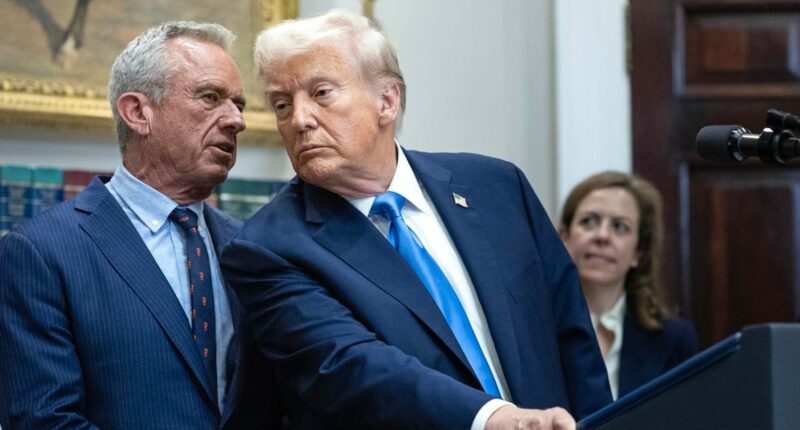Share this @internewscast.com
It all began with an unsupported claim suggesting that using Tylenol during pregnancy might increase the risk of autism in children. However, President Donald Trump and Health Secretary Robert F. Kennedy Jr. soon broadened their message, implying that infants and young children should steer clear of the commonly used painkiller.
“Don’t give it to the baby when the baby’s born,” Trump said of Tylenol at a Cabinet meeting on Thursday.
Kennedy jumped in to suggest that children who are circumcised have higher autism rates, “likely because they’re given Tylenol.”
As their view on the medication has expanded recently, scientists assert that the idea linking young children consuming Tylenol to autism is highly improbable.
“There is even less data supporting a connection between Tylenol use in early childhood and autism than there is for Tylenol use during pregnancy,” stated David Mandell, a professor of psychiatry at the University of Pennsylvania.
Most scientific research indicates that moderate Tylenol use during pregnancy is safe, and many autism experts argue the evidence does not confirm it as a cause. For young children, the American Academy of Pediatrics affirms that Tylenol is safe if used correctly under pediatrician supervision. They advise not to give it to children under 12 weeks unless prescribed, as it can obscure fevers or early symptoms of sepsis needing urgent medical treatment.
The initial announcement from Trump and Kennedy about Tylenol and autism occurred on September 22, introducing regulatory measures to limit its use during pregnancy. Although Trump advised expectant mothers to “fight like hell not to take it,” the regulatory changes were relatively mild. The FDA sent a notice to doctors to “consider minimizing the use of acetaminophen during pregnancy for routine low-grade fevers.” (Acetaminophen is the core component of Tylenol.)
The FDA noted, however, that Tylenol remains the safest over-the-counter pain relief option during pregnancy and confirmed that “a causal relationship has not been established” with autism.
The agency made no mention of risks to children. Nevertheless, both Kennedy and Trump have repeated such warnings on several occasions — a significant leap from the FDA messaging.
In a post on Truth Social two weeks ago, Trump wrote that young children should not take Tylenol “for virtually any reason.”
Kennedy, meanwhile, doubled down on his statement about circumcision in a post on X on Friday, saying that “the observed autism correlation in circumcised boys is best explained by acetaminophen exposure.”
Dr. Joshua Gordon, chair of the psychiatry department at Columbia University, said the snowballing warnings about Tylenol represent a common tactic among those looking to attribute autism to vaccines or medications.
“Robert F. Kennedy and his colleagues will start with asking one question, and when the scientific community answers that question, they’ll tweak the question slightly to prolong, if you will, the debate on the topic,” Gordon said.
He pointed to the way the anti-vaccine community first raised concerns about the measles, mumps and rubella vaccine in connection to autism, then pivoted to focus on a mercury-based preservative in vaccines and on the cumulative amount of vaccines administered in childhood. (Each of these concerns has been debunked.)
“No amount of scientific evidence can ever be conclusive for this community,” Gordon said. “The debate is like a hydra. You cut off one head and they’re just going to try to emerge with another.”
The Department of Health and Human Services did not respond to a request for comment.
White House spokesperson Kush Desai said that “the President is right to express his commonsense opinion that Americans should use caution with all medications and adhere to FDA guidance, including the longstanding guidance regarding appropriate use and dosage of acetaminophen in young children.”
A spokesperson for Kenvue, the maker of Tylenol, said the medication is “one of the most widely studied pain relievers and fever reducers in infants and children, and numerous randomized, controlled clinical trials support the safety of acetaminophen in infants and children when used as directed.”
The spokesperson added that “independent, sound science clearly shows that taking acetaminophen does not cause autism.”
Mandell said claims that Tylenol increases autism rates in babies and toddlers are based on low-quality studies that don’t prove causation.
He pointed to a small study that found younger children with autism were significantly more likely to take acetaminophen for a fever compared to children without the disorder. Mandell said the study had limitations: Parents had to recall how often they gave their children acetaminophen, and children with autism are more prone to discomfort, which may lead their parents to give acetaminophen more frequently.
One scientist in particular, immunologist William Parker, has fueled the theory that autism can be attributed to acetaminophen use in babies and young children. In his post on X, Kennedy cited a paper by Parker that says there is “overwhelming evidence” that acetaminophen triggers autism. But the paper hasn’t been peer-reviewed or published in a scientific journal.
Kennedy also mentioned a Danish study from 2015 that concluded that boys who are circumcised may have a greater risk of developing autism. But the study authors said they couldn’t attribute the purported effect to Tylenol.
Dr. Sian Jones-Jobst, a pediatrician and the president of Complete Children’s Health, a pediatric network in Lincoln, Nebraska, said very few pediatricians administer Tylenol for circumcisions; instead, the common practice is injecting a numbing medication.
She added that in other situations, Tylenol is a useful tool to reduce fever or pain.
“You shouldn’t let your child suffer if they’re obviously uncomfortable,” Jones-Jobst said.











